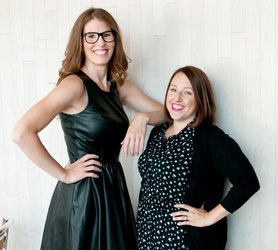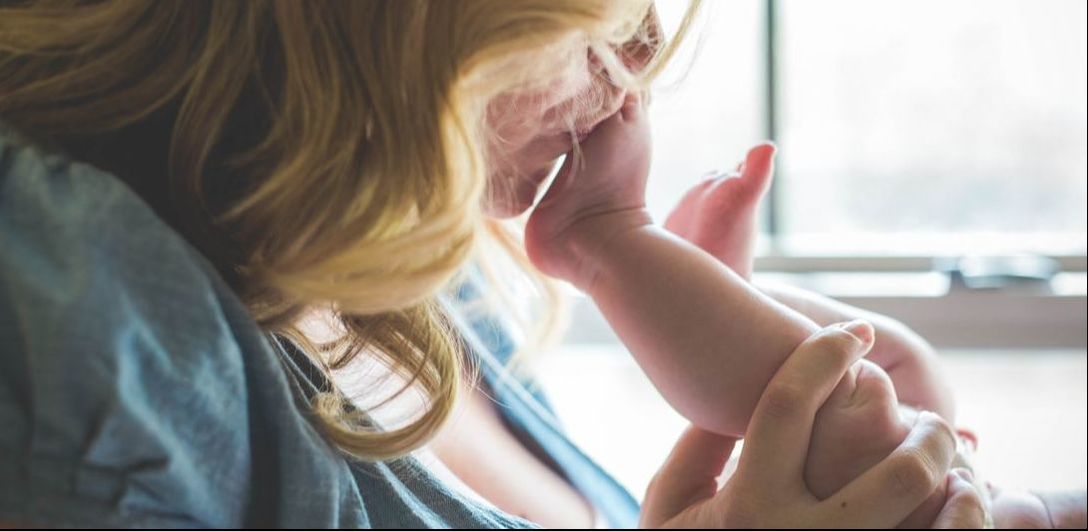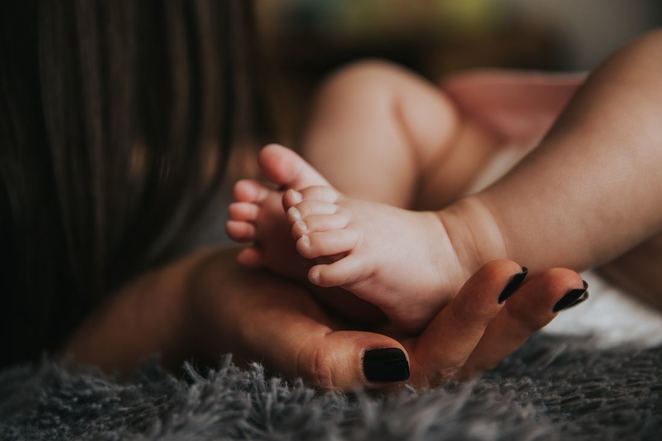|
When a new baby arrives, everyone comes out of the woodwork, desperate for a hold. We are used to welcoming new babies in this way. Crowds at the hospital, more crowds and cups of tea at home. Then... no one. And new parents are left alone to find their way, while they are often still working out how to feed and settle their baby.
Is all this contact with others actually causing a disruption to the process of transitioning to life outside the womb? In our podcast "Help me keep close to my baby", we hear from midwife and leading breastfeeding researcher Dr Robyn Thompson who thinks so. Minimal handling of the baby from anyone other than the parents has been found to make learning breastfeeding (by mother and baby) easier and prevents complications like engorgement, mastitis and nipple damage.
Robyn recommends even hospital staff not touch the baby unless there is a concern, and to facilitate the mother receiving the baby into her own hands at birth. Babies also play a crucial role in completing the birth process - when they are given the time and space to make their own way to the breast, they facilitate the efficient birthing of the placenta with minimal bleeding. (Google "newborn breastcrawl".) And when they do their own attachment to the breast, rather than being forced on by a third person, they are much less likely to cause nipple damage from incorrect attachment.
Extended family can support this vital early period, by offering help to keep the parents with their baby, eg by making meals, walking the do and caring for older children. Some mothers may want you to take the baby for a while, so she can shower, or rest. Others may not. This preference and its timing is highly individual between parents. In this podcast we also hear from a mother of her experience of knowing instinctively the importance of keeping life very simple and cocooned in the first 6-8 weeks of her babies' lives. Sometimes people didn't understand their seclusion, but she believed it to be the safest option for her baby, and the best way for her to recover and adjust. Separation of parents and their babies is only done by humans. Even zookeepers know to stay away from new mothers in their care. This documentary by a neonatologist shows how his care of premature or unwell babies has changed over the decades - from having lots of gadgets and separation, to kangaroo care and keeping parents and babies together.
The world's first certified Baby Friendly hospital, St Joseph's Hospital in Berlin, is an inspiring example of the benefits of keeping parents close with their premature or sick babies. You can see it in The Milky Way movie.
Podcast references:
Dr Robyn Thompson - http://www.breastfeedingconsultant.com/single-post/2017/09/02/The-First-Breastfeed The Birth Pause Dr Nils Bergman Sarah Blaffer Hrdy, Mother Nature (1999) Babies Celebrated: “ For species such as primates, the mother IS the environment.” Microbirth Movie By Sally Cusack
1 Comment
19/9/2017 "No one told me what it would be like" preparing prenatally for postpartum with Bebo MiaRead Now
When a baby is born, a new family unit is also birthed. There is a lot to learn, and to adjust to. While life goes on around you, for a new parent or parents, their world with a newborn shrinks. It becomes their entire universe. Life’s tasks, which seem so normal, can be more difficult to attain and become a stressor for a new mother. Canadian Doulas, Natasha Marchand and Bianca Sprague, founders of Bebo Mia, have a lot to say about this. Marchand and Sprague are strong supporters of post natal support and believe supporting new parents can change the trajectory of their parenting experience. Most of the pregnancy the focus sits firmly on the birth, but ignores the simple reality, that there’s a time after birth, a long time. In the early days this is when a parent will be the most in need of help. Little things can become big – simply going out to get the milk or putting washing on the line can be left wanting as she struggles with how to even take a shower. These two women work solidly to educate pregnant women that 1) You will need hands on help 2) Get ready to ask for it 3) Be specific in what you ask for Easier on paper, than reality. It may be helpful to note that post birth is a heady time. Visitors can take up a lot of a new parent’s day and also take them away from their baby. It’s so easy to do what we do in our adult lives – push on through. But with a newborn this is impossible. A hungry, tired, over stimulated new born will let his parents know in no uncertain terms what he needs.  photographer: Brooke Lark photographer: Brooke Lark
If only parents in first world countries had the 40 day lie in. What’s that? We are glad you asked.
Known to some as the 40 day lie-in, others as doing the month, there are many names for such rituals. In essence every culture across our globe, except the first world countries, believe the post-natal period is a key snapshot in time, when the person who has given birth is vulnerable to illness, is open energetically and in most need of nurturing. As such rituals for new mothers were created. The new mother is not permitted to go out, cook, get up out of bed (yes it's called a lie in for a reason). She is kept warm, not permitted to use air conditioning, told to avoid spicy foods, is nurtured, fed (with high protein broths, soups and slow cooked food), plugged with herbs, remedies and massages. Both she and baby are held, supported and swamped with love. Let’s now take a peek at our society. Parents are expedited out of the hospital system before they’ve learned how to feed, sent home to homes where, on the whole, community is not close by. Partners usually have to return to work and the stay at home parent is expected to pick up where life left off, because life hasn’t stopped. Households need to keep running, shopping needs to be bought, meals cooked and this falls to the one at home. For that person, if they were once working, this can be a most trying this time. The stay at home parent can feel forced into a role they didn’t expect. Add into the mix a baby - who parents are still getting to know, and the stress of learning how to navigate those early days (feeding, sleeping being a small part of this) and it looks a lot like a recipe for disaster. Sprague and Marcharnd have some tips. The first is to ask and ye shall receive. Ask visitors for help. Be specific. Please can you pick up milk on your way through and please can you actually put the milk in the fridge when you show up? This can be easier said than done, but Marchand and Sprague know that to get this right, is almost key to the stay at home parent’s well being. The Bebo Mia team suggest putting a plan in place before birth so the new parents don’t need to think about this afterwards- a schedule of sorts. Most pregnancies move into a nesting phase- just before birth. Why not incorporate this into a list of things to do? For example, before birth the parent to be could look around the house- what are the day to day things that keep the house functioning? Here’s a suggestion
The good news is that Marchand and Sprague have done some of this work already. Go to BeboMia.com/postpartumplan to create your postpartum plan. For those residing in Australia here are a couple of resources to post on the inside of your cupboard. Australian Breastfeeding Association has a 24 hour, seven days a week breastfeeding support line 1800 686 268 and their website www.breastfeeding.asn.au PANDA (Perinatal Anxiety & Depression Australia) National Helpline (Monday to Fridday, 9am to 7.30pm) 1300 726 306. 
Our guests for this episode: Natasha Marchand and Bianca Sprague are doulas, health practitioners and founders of Bebo Mia, which offers post natal support for doulas seeking business training, as well as Maternal Support Practitioner training program.
written and produced by:
Kimberly Lipschus |
Details
NE PLUS ULTRA
AuthorsThe authors of this segment are varied, each post will indicate the author of that particular post. For more information about our team, visit here Archives
February 2019
Categories |


 RSS Feed
RSS Feed